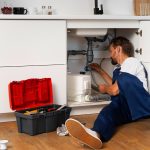The Internet may seemingly have a wealth of information about garden and backyard ponds, but much of the information being shared is not actually true and can have a detrimental effect on your pond. Here we are going to explore some of the most common pond myths.
Your Pond Should Be Located Downstream
This may seem like a logical decision. After all, a pond located downstream will receive a fresh flow of rainwater on a regular basis. Unfortunately, this so-called ‘fresh flow’ may also contain many contaminants, such as weed killer chemicals, fertilisers, and more.
The best place for your pond is a location which is higher up and which is visible. Not only will this keep your pond healthier for the living critters who depend on it, but also it will then be in a better viewing location for both you and any guests who visit you at home.
You Should Drain and Clean Your Pond
The most effort you will likely need to put into your pond is in the building of it (that is, if you choose to build it yourself). Once your pond has become established, you will need to do little more to keep it balanced. Bacteria freely available in nature will do a lot of the work keeping it in check, and natural systems like the nitrogen cycle will work to eliminate any toxins in your pond.
As a general rule, homeowners will only need to completely empty the pond once a year. This is if you are already performing partial water changes, cleaning the pond equipment, and changing the filters as part of your regular pond maintenance.
Your Backyard Pond Does Not Need a Pump
Homeowners often ask themselves one of two questions:
- Do I need a pond pump?
- what pond pumps do I need and why?
The quick answer to this is that your pond should be outfitted with a pond pump that also offers some level of filtration (this is particularly true if you are planning on having fish). Though some will argue that certain pond types and sizes do not require a professional pond pump, the vast majority of garden ponds will benefit from having a pump. The pump will not only keep the water circulating and clean (which helps with filtration) but it will also help keep insects and other unwanted predators at bay.
Do your research on when you should run your pond pump. Many homeowners try to use a timer on their pond pump so that it shuts down at night in order to save on energy costs. But keep in mind that your pond pump is helping support a living ecosystem that needs constant oxygen. The sudden deprivation of oxygen can have a detrimental effect on your pond and the life living within it.
Your Pond Water Must Be Tested Daily
A pool may need to be tested daily because human beings are entering it on a regular basis. However, a naturally balanced water garden or pond requires little to no testing. The only time you may need to test the water is if you suspect that you have an issue on your hands. Otherwise, stick to testing the water once a month.






Leave a Reply
You must be logged in to post a comment.